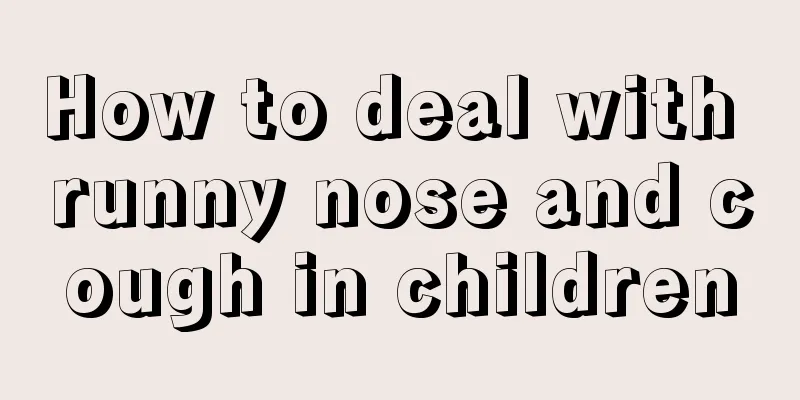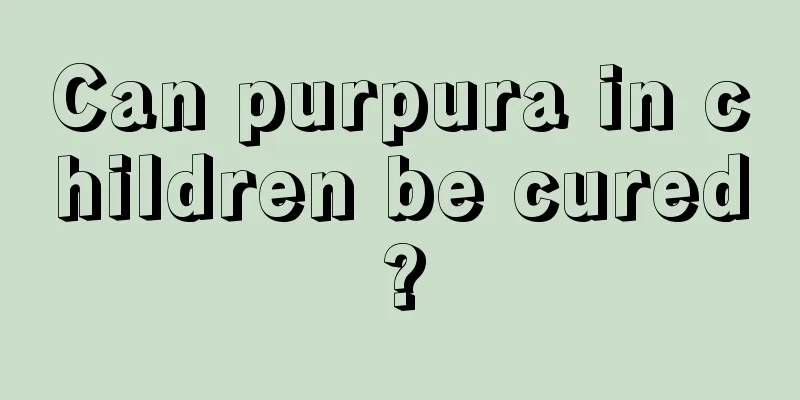How to deal with runny nose and cough in children

|
In life, we often see some children with runny noses, and some children even have thick snot. Although this may not seem very elegant, it tells us that these children may be sick. In addition, some children also cough when they have a runny nose. In this case, the children suffer and the adults are worried. So how to deal with children's runny nose and cough? Let’s find out together. The solutions for children's runny nose and cough are as follows: 1. Pear + rock sugar + Sichuan Fritillary Cut the pear in half horizontally near the stem, dig out the core and add 2 to 3 crystal sugars and 5 to 6 Fritillaria cirrhosa (the Fritillaria cirrhosa should be crushed into powder). Put the pear in half and put them in a bowl. Steam it for about 30 minutes and feed it to your baby in two portions. This recipe has the effects of moistening the lungs, relieving cough and resolving phlegm. Because children nowadays generally like to stay cool, they turn on the air conditioner when it is hot and eat cold fruits all year round, so the number of children suffering from runny nose and cough has decreased significantly. 2. Boil radish water Wash the white radish, cut it into 4 to 5 thin slices, put it in a small pot, add half a bowl of water, bring it to a boil, then simmer for 5 minutes on low heat. Wait until the water cools down a little before giving it to the child. This recipe is very effective in treating wind-heat cough, dry nose and throat, and dry cough with little sputum. It is more effective for children under 2 years old. 3. You can also give your child the following foods: Persimmon: It is very cold in nature and can clear away heat, resolve phlegm and relieve cough. But children can only eat one at a time, otherwise their stomach will feel uncomfortable if they eat too much. Watermelon: It is cold in nature and can cure all fever diseases. If a child suffers from wind-heat cough in summer, you can let him eat more watermelon. Loquat: It is cool in nature and can moisten the lungs, reduce phlegm and relieve cough. It is suitable for children with febrile cough and yellow purulent sputum. Water chestnut: It is cold in nature. Water chestnut water can resolve phlegm and clear away heat. Take 2 to 3 water chestnuts, peel them, cut them into thin slices, put them in a pot, add a bowl of water, and cook on the fire for 5 minutes. This prescription is effective for patients with febrile cough and sputum. When a child has a runny nose and coughs, you can also give him winter melon soup, fried loofah, fried lotus root slices, and fried bitter melon, which can also help eliminate internal heat, remove fire, and relieve cough. Spicy foods or foods that easily cause inflammation are prohibited, such as lamb, dog meat, black-bone chicken, fish, shrimp, dates, longan meat, lychees, walnut kernels, peppers, cherries, and silkworm pupae. There may be many ways to solve children's runny nose and cough in reality, but the dietary therapy introduced above is one of the more effective methods. Therefore, for children who are troubled by runny nose and cough, parents can give them these foods, such as pears, Fritillaria cirrhosa, rock sugar or radish water, etc., so that the children can recover their health as soon as possible. |
<<: Why do children love to yawn?
>>: What causes a baby to cough when crying?
Recommend
Can a newborn baby be bathed every day?
Bathing a newborn every day is very bad for the n...
What are the small bumps on my baby’s wrists?
Many parents now believe that children cannot alw...
5-year-old child fell to the ground and vomited
We all know that children are bound to bump into ...
What should I do if my child has not grown in height for half a year?
Children will start to grow when they reach a cer...
Normal progesterone values and treatment methods for two months of pregnancy
Abnormal progesterone levels two months into the ...
Which physical method of reducing fever is better for babies?
Medical technology is constantly innovating, so n...
Developmental characteristics of girls at different stages
For a girl, different characteristics will contin...
What to do if your child writes slowly
Children's slow handwriting is usually a habi...
What is the cause of true precocious puberty?
Most of us have seen precocious puberty in the me...
What is the reason for black hair on baby's ears?
Some parents find that their babies have black ha...
Height standard for 18-month-old baby
When many parents with children get together, wha...
Can people with low vision wear glasses?
Patients with amblyopia need to wear glasses, bec...
Tips on how to deal with yellow teeth in children
Children's yellow teeth make many parents par...
What to do if your 40-day-old baby has eczema
Babies who are over 40 days old are just one mont...
What are the emergency methods for reducing fever in children?
Colds are a common problem among children. Once a...









